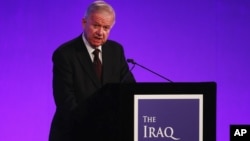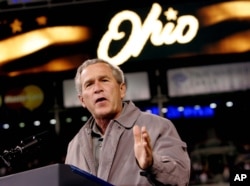Australia’s former prime minister joined other Western leaders Thursday in standing by their decisions to go to war in Iraq 13 years ago.
"Well, I defend that decision, of course I defend it, I don't retreat from it,” said John Howard, who was Prime Minister when Australia sent 2000 troops to join the American- and British-led coalition. “I don't believe, based on the information available to me, that it was the wrong decision. I really don't.”
The invasion of Iraq in 2003 ago was “unnecessary” and Iraqi dictator Saddam Hussein represented “no imminent threat” to Britain or other Western powers, according to a long-awaited official report on Britain's involvement in the Iraq War.
The inquiry led by John Chilcot, a former top British civil servant, heaped blame on politicians, intelligence officials, diplomats and generals for their role in the invasion and for the conduct of the years-long military operations by Britain’s forces, mainly in the south of Iraq.
In a scathing appraisal, Chilcot told a packed news conference in London that the planning and conduct of the military intervention was seriously flawed and “went badly wrong, with consequences to this day.” He referenced the recent suicide bombings in the Iraqi capital, Baghdad, that left more than 250 people dead.
“We have concluded that the U.K. chose to join the invasion of Iraq before the peaceful options for disarmament had been exhausted," Chilcot said. "Military action at that time was not a last resort.”
As the inquiry’s chairman explained the broad aspects of the monumental report, journalists continued to pick through the evidence and findings contained in 13 volumes. Much of the Chilcot report focused on the legal basis and intelligence justification for the invasion. The report excoriates then-British prime minister Tony Blair, his ministers and the intelligence services, saying their justifications for the invasion were “far from satisfactory.”
In explaining his decision to join the United States in the intervention, Blair told Britain’s parliament, “Iraq has biological and chemical weapons.” The claim was crucial in persuading a majority of British lawmakers to endorse the country’s participation in toppling Saddam Hussein.
Blair takes responsibility
On Wednesday, Blair took responsibility for taking Britain into war, expressing "more sorrow, regret and apology that you can ever know or believe." However he insisted the world is a better place because of the removal of Saddam.
White House spokesman Josh Earnest said Wednesday that the president and his staff have not read all the way through the lengthy document yet, but he said President Obama "has been dealing with the consequences of that fateful decision for the entirety of his presidency." He also said it is important that the United States "learn the lessons of those past mistakes."
Bush stands by decision
A spokesman for former U.S. President George W. Bush, who ordered the invasion of Iraq in 2003, released a statement Wednesday saying, "Despite the intelligence failures and other mistakes he has acknowledged previously, President Bush continues to believe the whole world is better off without Saddam Hussein in power."
Public policy expert William Galston of the Brookings Institution told VOA Wednesday that he agrees with the report that the international community had not yet exhausted all other options to eliminate the Iraqi threat.
He noted that U.N. arms inspector Hans Blix has maintained that the U.N. sanctions regime "was not as weak as was represented, and was not in eminent danger of crumbling, that the inspections regime was very robust, and that Saddam couldn't have done anything major without being detected or without expelling the international inspectors."
Galston says one of the big questions the report raises is "whether the status quo was as untenable as the international community said it was."











